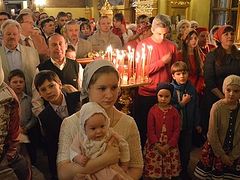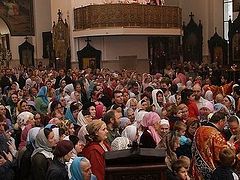I saw two photographs on a priest’s Facebook page: There was a cross procession mainly consisting of old ladies on one of them, and a festival in a mosque with mostly young men praying shoulder to shoulder on the other one. And there was a caption: “Islam is the religion of young men of the East, and Christianity is the religion of elderly women in the West.”
I am not sure about the West, but there are indeed many elderly people in our Church, though they are far from being a majority. In the churches of Ekaterinburg that my wife and I attend—St. Alexander Nevsky Church of New-Tikhvin Convent and the Great Church of St. John Chrysostom Church—married couples with children (like us) make up most of the parishioners. There are quite a lot of young people too, and plenty of old ladies. Old women are stable and some even come with their chairs. They settle down comfortably, take their prayer-books out, pray and follow the service attentively. From the perspective of a non-believer old ladies are the weakness of the Church. They are aged, feeble and are seemingly incapable of anything. It is quite different with bearded men in mosques who block streets to slaughter sheep for Qurban Bairam and are ready to conquer the world for their faith. Such things impress. But it is quiet in Orthodox churches, icon lamps slowly burn in front of icons; people stand, pray and cross themselves; the service is celebrated with reverence. Modern people, who want everything at once without making any efforts, feel uncomfortable at church. Someone often comes and says: “Alright, I have come to believe that our Orthodox faith is the true faith; but what can you offer me at the Church? I want to gain success and respect, earn a lot of money, and be healthy and happy!”
But our Orthodox faith is not about this at all; it is entirely about the salvation of the soul and the victory over death. As Christ said to His disciples: For what is a man profited, if he shall gain the whole world, and lose his own soul? or what shall a man give in exchange for his soul? (Mt. 16:26). It is not the custom in our Church to share the stories that Western preachers are very fond of: “I have come to church and God helped me earn a million dollars!” In Orthodoxy it is often the other way round: First someone earned millions and then began to think deeply about his soul, distributed his possessions among the poor and choose to follow Christ. An illustrative example is the Life of St. Seraphim of Vyritsa who was almost our contemporary.
The Church teaches: love God and your neighbor, live according to the commandments and struggle with your sins. That is far more difficult than walking to Mecca and back because this is your life’s journey; and whether or not you achieve your aim is known to God alone. You got baptized? Well done! You came to church for a feast? That is fine! You started reading the morning and evening prayers? That is even better! However, you will not draw very close to God until you begin to take care of your soul and struggle with your sins. There are cases in modern Church life when someone attends church, keeps the fasts, goes on pilgrimages to holy places, but does not love people—then all he does is in vain. After all, the criterion of your faith is your love for God and people and not the frequency of church-going or the holy places you have visited. For this is the law and the prophets (Mt. 7:12). As St. Anthony the Great, the father of monasticism, said: “Our life and our death is with our neighbor. If we gain our brother, we have gained God, but if we scandalize our brother, we have sinned against Christ.”[1]
However, few young people care about the salvation of their souls—above all they want to achieve something and find self-fulfillment. Imagine a group of students sitting on the steps of a university and talking about repentance. One of them says: “Hurray! Great Lent is coming soon! Looking forward to it! I can’t wait to stop hanging out on social networks and playing tanks! I will turn off my smartphone, attend the Vespers after lectures and read the Great Canon in the evening!” His fellow-student answers: “As for me, I want to spend the weekend at a monastery! Its Lenten services are so strict and long and it will be good to think about my sins during them!” Is this picture real?
Once things were quite different in Russia. Why? Because every family gave a Christian upbringing to their children; there was the tradition and this tradition was Orthodox. In the mid-seventeenth century, Patriarch Makarios III of Antioch and Archdeacon Paul of Aleppo paid a visit to Russia, and later the archdeacon wrote:
“I marvel at how these Russians pray from morning to night! They stand in churches motionless like stones. The Tsar’s Lenten menu consists only of shchi (cabbage soup), radishes and bread. After the Liturgy they have a meal and then the bells ring to announce the evening service. As for us, after their long services we would leave churches with absolutely worn-out legs and pain in our backs. I have the impression that these Russians have legs of iron and are all saints.”
In old Novgorod, churches stood about 110 yards from each other. The little, agreeable town of Borovsk, on the outskirts of which I lived at the Dependency of the Holy Protection of St. Paphnutius’s Monastery, once had as many as twenty-eight churches with a population of 10,000.
In the years of state atheism, Orthodox traditions were stamped out in our country for several generations in a row. As we know, they cannot reappear by themselves; it is a long process that starts from our… old ladies. It is they (who were brought up in faith from childhood, walked dozens of miles for services to the rare churches that had miraculously survived the ravages and desecration, prayed secretly using hand-written prayer-books before the icons that they had hidden from the eyes of others) who rescued our churches from oblivion. Our “church old ladies” are not the weakness of the Church; rather, they are the blessing of God that preserved faith in the darkest of the godless times.
I recall how Georgian female choristers from St. Barbara’s Church in Tbilisi told me that they had had a tradition of serving not only in Georgian but also in Slavonic in their church—for the old Russian lady parishioners, thanks to whom the temple had not been closed and ransacked in the period of anti-Church persecution. The rector used to call them respectfully, “white headscarves”. As long as at least one of them was alive, he would worship in Slavonic rigorously. The Holy Protection Cathedral in my native Kamyshlov [a town in the Sverdlovsk region.—Trans.] was also rescued from oblivion by old ladies who saved it by prayer, washed it clean, rebuilt it and then became its first parishioners. They did not take seats of honor; rather, they became singers, janitors, seamstresses and cooks. What did the Savior say? If any man desire to be first, the same shall be last of all, and servant of all (Mk. 9:35). Not only did they teach me to sing and read in the choir: they also taught me a sincere Christian love that surrounded me like a warm down blanket during a frost.
When it comes to young people, today young people in our Church are different from those who filled our churches in the 1990s when, let us be frank, it was fashionable to go to church in our country. Our churches were scarce and cramped, and half of newcomers knew neither, “Our Father”, nor the Creed by heart. In our days, if young people go to church, they do it with serious intentions and after careful consideration. They want to understand everything themselves, ask questions, sometimes awkward ones, and that is very good. True, our young people often stand in churches in smart jackets and with backpacks on their shoulders, but they hold service books in their hands, pray thoughtfully, with sense, and stand from beginning to end. Many go to confession and Communion. As you look at them you realize that it is no longer a fashion or a game—it is life where everything is genuine. This means they will live by faith and teach their children the same.
Before the Nativity I met with my brother Ilia (he is sixteen years my junior) at our parents’. I asked him how he had greeted the New Year. He shrugged his shoulders and said: “Alone with my wife. We had dinner and then went to sleep.” I was surprised: “And what about walking around till the morning with your friends?” He replied: “We have not gathered with our friends for the New Year for five years now. All of us have families, children, and everybody stays at home. But we certainly gather at Nativity! It has become our tradition. That is a true festive occasion! As for the New Year, it is for those who watch these ever-boring and annoying pop singers on TV, while enjoying the Russian salad and ‘herring under a fur coat’ [or dressed herring: a Russian layered salad composed of diced herring covered with layers of various grated boiled vegetables.—Trans.].”
Honestly, I was amazed and happy to hear these words. It is not to say that my brother and his friends who are in their early thirties go to church every Sunday and observe all the fasts—that would not be true. But it is a real fact that they don’t enjoy and value the New Year as much as their parents and my peers (in the late forties) who grew up in the Soviet Union do.[2] The Nativity of Christ makes a great difference! Even many of those whom you would otherwise not drag to church by force go to church at the Nativity. Even out-and-out sceptics hurry to church on this day to ask the newborn Christ for something known to them alone.
When my wife and I were travelling to church by bus, I met an acquaintance whom I knew before church:
“How are you doing?”
“I am doing well.”
“So am I.”
“Where are you going so early on Sunday?”
“I need to be somewhere in the morning.” (And he names the bus-stop near the church).
Knowing that he was not interested in religion I simply ignored his words. Later that morning I saw him carrying a little baby in his arms for Communion in the church. I thought: “Why did you not tell me this on the bus? There is nothing to be ashamed of in coming to church early in the morning on Sunday and praying to God.” He must have been too shy to tell me. At the beginning I too was ashamed of telling my friends that I had become a church-goer, fearing that they would say, “There is surely something wrong with him! He was a normal guy, but now he sings with old women in church!”
We talked after the service. He said:
“I take my godchildren for Communion every Sunday! Today it is my sister’s son, and last Sunday it was my brother’s daughter.”
Another acquaintance of mine who earlier had not been especially pious was standing in the corner behind the columns and praying through the service. He looked serious and concentrated. He was listening to the priests’ exclamations as if they were the announcement of a sentence; without frowning or clenching his fists, humbly and simply. Once he had seen a familiar face, he relaxed a little. “Happy feast, Denis!”—“The same to you!”
Later, I saw an old comrade who had previously had a business in Moscow. He used to call me only on business matters. Now he was walking towards the chalice with a little son with his arms crossed and smiling. I came up and we embraced. It turned out that he had sold his business in Moscow and was building a house in the country. Once they had their son baptized, they firmly decided to go to church regularly.
I also met a deputy of the State Duma whom I have known. His wife and children go to church every Sunday and the children go to Sunday school. Sometimes he went to pick them up after the service. Formerly he would always wait in the car without going into the church. And now that they have three children he stood in the church with his family, crossed himself, and made bows.
And now there are many people in the Church who once were “too busy” to care about the faith: they had business, business, and more business… “Am I some fool that bows to priests? My God is in my soul. You beat your foreheads against the floor and bring money to church!” I cannot count the times I heard these words before! But when you have a family and children, these foolish things disappear quickly—as soon as you keep fast a little, take a prayer-book into your hands and come to your first Communion. And see your child’s happy eyes in church.
There are new people in church all the time. True, some of them leave, yet there are those who remain. And it is the true quiet miracle of our faith. When someone lives “like everybody else” for years but says at some point, “Enough! I cannot live without God anymore!” And begins to go to church.





